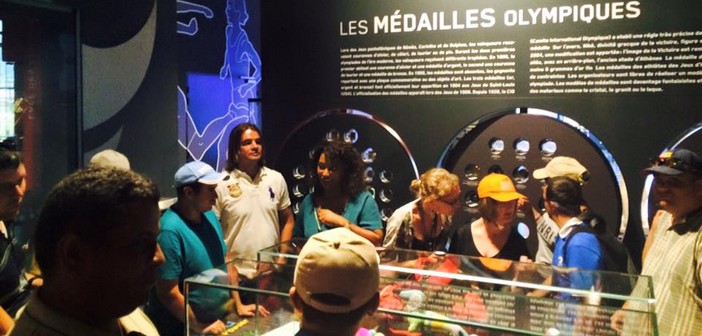At the National Museum of Sport and behind the scenes of the Allianz Riviera yesterday afternoon, 57 people with mental disabilities were able to tour the facilities. An initiative led by the city of Nice, in collaboration with ADAPEI-AM, the departmental association that supports these individuals. On the agenda: activities, general culture, and an idol from OGC Nice.
The 57 lucky participants of the day are divided into several groups, accompanied by around fifteen attendants by their side. In the “Olympism” section, Flora Gervais, one of the two guides, shows medals to the visitors. She lets them touch, holds them out, and encourages them to look at the inscriptions. Some are surprised by their weight, but this doesn’t stop one person with a mental disability from keeping a medal around their neck after the others are returned. “Hey, champ! You need to give it back,” Flora gently tells them. Responsible for cultural mediation at the Museum, she encourages everyone to participate during the visit. “We have to find ways to help them understand, and the tactile element is very effective,” she explains, in order to “introduce them to sports they don’t know about.”
The visitor thus becomes an actor. This is illustrated by a group gathered in a circle in the next room. A person with a mental disability climbs one of the Tour de France’s hills using a bicycle simulator. And as soon as the bike seat is vacated — “it’s too hard” is heard — it is immediately occupied again. Practice is the key word of the day. Flora’s colleague whispers in the ear of a supporter of the Spanish football team, as shown by their jersey. Moments later, they start miming a swimmer, and friends have to guess the sport, from golf to tennis to running. The two guides congratulate with a cascade of “Well done!” or encourage someone who is too shy to act. “Come on, let’s do it together,” they say with a constant smile.
The Allianz Riviera, its behind the scenes, and its “surprises”
The attendants gladly participate in the games, like a fencing duel or a giant foosball game, while ensuring that any stragglers are brought back in time to head to the OGC Nice club stadium. Deputy Mayor of Nice in charge of fighting discrimination, Maty Diouf, shares her emotion observing these individuals with mental disabilities. She feels “a lot of wonder. We learn everything from them, they don’t cheat,” she confides, shaking the friendly hand offered by a boy. This visit is “an opportunity for them to discover and take ownership of these places, especially since most have a passion for sport,” explains Maty Diouf.
While the choice of the National Museum of Sport seems logically obvious, what about that of the Allianz Riviera? The privileged ones enter through the official players’ entrance on match days, discover the press conference room where its role and the structures of the sports complex are explained to them. Not a sound, not a word, all are attentive. Unless they were all waiting eagerly to head to the locker rooms: as soon as the announcement is made, one person with a disability leaps up, eager: “oh yes, let’s go!”
And after a group photo in front of the entrance, they look at the jerseys, the warm-up room, or the seats that Digard, Hassen, and Amavi sit on. Deputy Mayor in charge of sports events, José Cobos takes the time to chat with everyone. One of the club’s emblematic figures maintains an undiminished popularity, greeted with cheers. He too feels and senses emotion. “It’s an honor for me to be with you,” he tells them before applause breaks out.
To end this day, the 57 participants will be able to take home a poster of the previous season’s local team signed by José Cobos and Christophe Meslin, a former player who came for the occasion. All smiles, they leave after a final photo with their Nice idols.


